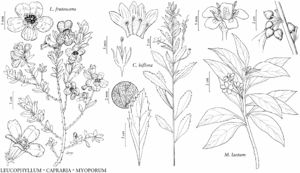Difference between revisions of "Capraria biflora"
Sp. Pl. 2: 628. 1753.
FNA>Volume Importer |
FNA>Volume Importer |
(No difference)
| |
Revision as of 18:29, 24 September 2019
Stems branched, 4–20 dm, hirsute to glabrate. Leaves: blade spatulate, 30–80 × 5–35 mm, glabrous or moderately hirsute. Pedicels 5–22 mm, glabrous or glandular-pubescent. Flowers bilaterally symmetric, 10–13 mm; sepals 4–7 mm, glabrous; corolla white, with purple spots inside, tubular-funnelform, villous inside; stamens 4(or 5), didynamous; ovary glabrous; style included, 3–5 mm, glabrous or sparsely pilose. Seeds 0.4–0.5 × 0.3–0.4 mm. 2n = 28, 60 (Africa).
Phenology: Flowering fall–spring.
Habitat: Beaches, dunes, empty lots, roadways, streams.
Elevation: 0–10 m.
Distribution
Fla., Mexico, West Indies, Central America, South America (e of the Andes), Pacific Islands (Galapagos Islands).
Discussion
In the United States, Capraria biflora grows only in the southern tip of Florida, where it is widely distributed on the southern quarter of the peninsula as well as throughout the Florida Keys. It is commonly cultivated throughout the world for its purported healing properties.
Selected References
None.
